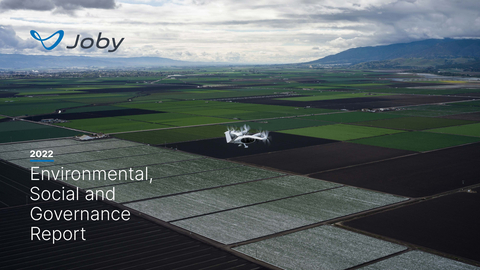Joby Releases First Annual Environmental, Social, Governance Report
Joby Releases First Annual Environmental, Social, Governance Report
SANTA CRUZ, Calif.--(BUSINESS WIRE)--Joby Aviation, Inc. (NYSE:JOBY), a company developing electric vertical take-off and landing (eVTOL) aircraft for commercial passenger service, today announced the release of its first annual Environmental, Social, Governance (ESG) report.
As part of the Company’s commitment to positive impact, Joby has released its first ESG report, accessible on Joby’s website. The report, which covers Joby’s progress through 2022, marks a first step for Joby – and the wider eVTOL industry – in understanding the holistic impact of its manufacturing and planned operations. It also allows the company to gain a deeper insight into areas for improvement as it grows.
The development of the report was led by Claire Boland, Joby’s newly-appointed Sustainability Lead. Boland brings a decade of expertise leading multinational organizations on strategy and execution of greenhouse gas measurement and reduction, sustainable sourcing, and circular product development, including roles at PVH Corporation and PepsiCo, Inc.
“I’m delighted to join a company that is changing the future of transportation for the better while being transparent about how we impact the environment and local communities,” commented Boland.
“Every team member at Joby touches a part of this report. It’s a first step that will help us build a robust plan of action to ensure the company positively impacts the environment, the people who work here and the larger communities we operate in.”
The report includes program and performance metrics across Safety, Environment, Social, and Governance topics. These include Joby’s approach to safety strategy, the Company and aircraft’s environmental impact, team member demographics, and corporate governance structure.
Included in the report are the results of what is believed to be the eVTOL industry’s first comprehensive life cycle assessment (LCA) to include both manufacturing and operations, which was undertaken in partnership with the U.S. Department of Energy’s National Renewable Energy Laboratory (NREL).
Based on the Company’s knowledge at the time of the analysis, the LCA estimates the life cycle greenhouse gas impact of the Joby aircraft to be 1.5x smaller than an electric car, assuming both vehicles are charged by 100% renewable electricity, used for commuting purposes, and manufactured at scale. Joby intends to continue analyzing the projected environmental impact of its aircraft as the Company continues to develop its production facilities and concept of operations.
“We intend to do everything we can to accelerate the aviation industry’s transition to climate-neutral flight,” said JoeBen Bevirt, Founder and CEO at Joby. “This report marks an important step towards a deeper understanding of our environmental footprint and we look forward to building on this foundation in the years ahead.”
In June, Joby celebrated the launch of production at its pilot production line in Marina, CA, as the first aircraft built on the line secured a Special Airworthiness Certificate from the Federal Aviation Administration (FAA), clearing it to begin flight testing. The aircraft is expected to be delivered to Edwards Air Force Base as part of Joby’s contract with the U.S. Air Force worth up to $131 million.
About Joby
Joby Aviation, Inc. (NYSE:JOBY) is a California-based transportation company developing an all-electric, vertical take-off and landing air taxi which it intends to operate as part of a fast, quiet, and convenient service in cities around the world. To learn more, visit www.jobyaviation.com.
Forward Looking Statements
This press release contains “forward-looking statements” within the meaning of the “safe harbor” provisions of the Private Securities Litigation Reform Act of 1995, including but not limited to, statements regarding the development and performance of our aircraft; and our business plan, objectives, goals and market opportunity. You can identify forward-looking statements by the fact that they do not relate strictly to historical or current facts. These statements may include words such as “anticipate”, “estimate”, “expect”, “project”, “plan”, “intend”, “believe”, “may”, “will”, “should”, “can have”, “likely” and other words and terms of similar meaning in connection with any discussion of the timing or nature of future operating or financial performance or other events. All forward looking statements are subject to risks and uncertainties that may cause actual results to differ materially, including: our ability to launch our aerial ridesharing service and the growth of the urban air mobility market generally; our ability to produce aircraft that meet our performance expectations in the volumes and on the timelines that we project, and our ability to launch our service; the competitive environment in which we operate; our future capital needs; our ability to adequately protect and enforce our intellectual property rights; our ability to effectively respond to evolving regulations and standards relating to our aircraft; our reliance on third-party suppliers and service partners; uncertainties related to our estimates of the size of the market for our service and future revenue opportunities; and other important factors discussed in the section titled “Risk Factors” in our Annual Report on Form 10-K, filed with the Securities and Exchange Commission (the “SEC”) on March 1, 2023, and in future filings and other reports we file with or furnish to the SEC. Any such forward-looking statements represent management’s estimates and beliefs as of the date of this presentation. While we may elect to update such forward-looking statements at some point in the future, we disclaim any obligation to do so, even if subsequent events cause our views to change.
Contacts
Joby Aviation
Investors:
investors@jobyaviation.com
Media:
press@jobyaviation.com

